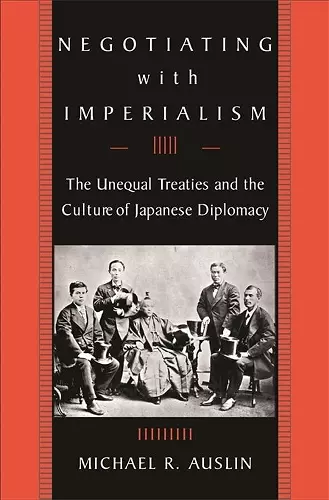Negotiating with Imperialism
The Unequal Treaties and the Culture of Japanese Diplomacy
Format:Paperback
Publisher:Harvard University Press
Published:15th Oct '06
Currently unavailable, and unfortunately no date known when it will be back

In the mold of Ronald Toby's seminal work on early modern Japanese statecraft, Michael Auslin offers a superb study of Japanese diplomacy, 1858-1872. There can no longer be any excuse for viewing the Japanese as passive victims of the unequal treaties. Auslin demonstrates their success at manipulating the Western powers and achieving their principal goal--protecting Japan's territorial sovereignty. -- Warren I. Cohen, University of Maryland, Baltimore County In the first major reexamination of the 'opening of Japan' in decades, Auslin describes the changing diplomatic culture of Japan as the country's leaders sought to understand a world dominated by Western power, wealth, and ideas. Reflecting the latest scholarship on imperialism, the book treats Japan not as a passive victim of the West's coercive diplomacy but as a nation with its own agendas, strategies, and negotiating tactics. In addition, Auslin shows how Western powers were often willing to cooperate with Japan and help it incorporate itself into the globalizing world. Students of comparative imperialism, globalization, and Japanese foreign affairs will find this an indispensable work. -- Akira Iriye, Harvard University
In a compelling analysis of the interplay among assassinations, Western bombardment of Japanese cities and fertile cultural and intellectual exchange, Auslin offers a persuasive reading of the birth of modern Japan at the signing of the “unequal” commercial treaty with the U.S., and its struggle to determine its future relations with the world.
Japan's modern international history began in 1858 with the signing of the "unequal" commercial treaty with the United States. Over the next fifteen years, Japanese diplomacy was reshaped to respond to the Western imperialist challenge. Negotiating with Imperialism is the first book to explain the emergence of modern Japan through this early period of treaty relations.
Michael Auslin dispels the myth that the Tokugawa bakufu was diplomatically incompetent. Refusing to surrender to the West's power, bakufu diplomats employed negotiation as a weapon to defend Japan's interests. Tracing various visions of Japan's international identity, Auslin examines the evolution of the culture of Japanese diplomacy. Further, he demonstrates the limits of nineteenth-century imperialist power by examining the responses of British, French, and American diplomats. After replacing the Tokugawa in 1868, Meiji leaders initially utilized bakufu tactics. However, their 1872 failure to revise the treaties led them to focus on domestic reform as a way of maintaining independence and gaining equality with the West.
In a compelling analysis of the interplay among assassinations, Western bombardment of Japanese cities, fertile cultural exchange, and intellectual discovery, Auslin offers a persuasive reading of the birth of modern Japan and its struggle to determine its future relations with the world.
In the mold of Ronald Toby's seminal work on early modern Japanese statecraft, Michael Auslin offers a superb study of Japanese diplomacy, 1858-1872. There can no longer be any excuse for viewing the Japanese as passive victims of the unequal treaties. Auslin demonstrates their success at manipulating the Western powers and achieving their principal goal--protecting Japan's territorial sovereignty. -- Warren I. Cohen, University of Maryland, Baltimore County
In the first major reexamination of the 'opening of Japan' in decades, Auslin describes the changing diplomatic culture of Japan as the country's leaders sought to understand a world dominated by Western power, wealth, and ideas. Reflecting the latest scholarship on imperialism, the book treats Japan not as a passive victim of the West's coercive diplomacy but as a nation with its own agendas, strategies, and negotiating tactics. In addition, Auslin shows how Western powers were often willing to cooperate with Japan and help it incorporate itself into the globalizing world. Students of comparative imperialism, globalization, and Japanese foreign affairs will find this an indispensable work. -- Akira Iriye, Harvard University
Besides the merit of its specific subject, Auslin's succinct book in a more general sense provides a significant dismantling of historical and historiographical boundaries on a number of levels...Auslin is a capable writer; his analysis is astute, engaging and carefully crafted. -- Robert G. Kane * Pacific Affairs *
Negotiating with Imperialism breaks new ground in the study of modern Japanese diplomatic history. In it, Michael R. Auslin presents a wealth of detail on Japanese foreign interactions between 1858 and 1872 when Japanese and Western diplomats carried out a series of hard-fought negotiations that defined Japan's place in a new global environment. Following the long tradition of diplomatic historians, Auslin grounds his work on a thorough reading of British, American, and Japanese archival materials, but he also offers a compelling interpretive framework based on the premise of an evolving Japanese "culture of diplomacy." -- M. William Steele * Monumenta Nipponica *
Many studies have been published on the bothumatsu period, making it no longer easy for one scholar to discuss this entire span of time within a single conceptual framework. Negotiating with Imperialism blows some fresh air on to what had become the rather stagnant atmosphere of this intensely studied subject...It is the very clarity and persuasiveness of the book's perspectives on the issues and history that stimulate us to present such alternative interpretations. Without doubt, it will contribute to further enlivening the study of the opening of Japan. -- Iokibe Kaoru * Social Service Japan Journal *
- Nominated for John K. Fairbank Prize in East Asian History 2005
- Nominated for John Whitney Hall Book Prize 2006
ISBN: 9780674022270
Dimensions: 235mm x 156mm x 16mm
Weight: unknown
276 pages